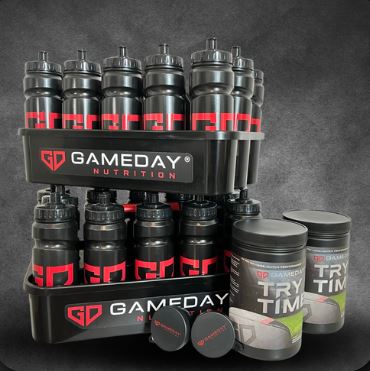Fueling for the Field: A Guide to Rugby Nutrition


Rugby is a physically demanding sport that requires a high level of fitness, strength, and endurance. To perform at your best on the field, it’s important to fuel your body with the right nutrients. In this guide, we’ll explore the key principles of rugby nutrition and offer tips for optimizing your diet to maximize your performance.
Macro and Micro-Nutrients
To fuel your body for rugby, you need to focus on both macro and micro-nutrients. Macro-nutrients include carbohydrates, proteins, and fats, which provide energy for your body to function. Micro-nutrients include vitamins and minerals, which support various bodily functions.
Carbohydrates are a critical fuel source for rugby players. click here They provide the energy needed for high-intensity exercise and help to maintain blood sugar levels during long games. Good sources of carbohydrates include whole-grain bread, pasta, rice, and fruits.
Proteins are essential for repairing and building muscle tissue. Rugby players require more protein than the average person due to the high physical demands of the sport. Good sources of protein include lean meats, fish, eggs, and dairy products.
Fats are an important energy source and also play a role in hormone production and cell membrane function. However, not all fats are created equal. Unsaturated fats, such as those found in nuts, seeds, and oily fish, are healthy and should be included in a rugby player’s diet. Saturated and trans fats, which are found in processed foods and fried foods, should be limited.
Vitamins and minerals play a crucial role in various bodily functions, including energy production and muscle recovery. Good sources of vitamins and minerals include fruits, vegetables, and whole grains.
Hydration
In addition to a well-balanced diet, proper hydration is crucial for rugby players. Dehydration can lead to a decrease in performance and an increased risk of injury. During exercise, it’s important to drink fluids regularly to replace the water lost through sweat.
Water is the best choice for hydration, but sports drinks can be useful for longer games or intense training sessions. Sports drinks contain electrolytes, which help to maintain proper fluid balance and provide energy during prolonged exercise.
Timing and Quantity
The timing and quantity of your meals and snacks are also important factors to consider when it comes to rugby nutrition. It’s best to eat a meal 2-3 hours before a game or training session to give your body time to digest and absorb the nutrients.
A pre-game meal should be high in carbohydrates and moderate in protein and fat. Good options include a turkey sandwich on whole-grain bread, pasta with lean meat sauce, or a rice bowl with vegetables and grilled chicken.
Snacks can be useful for maintaining energy levels during long games or training sessions. Good options include fruit, granola bars, or a small sandwich. It’s important to avoid high-fat and high-sugar snacks, which can lead to a crash in energy levels.
After a game or training session, it’s important to refuel your body with carbohydrates and protein to aid in muscle recovery. Good post-workout meals include a protein shake with fruit, a turkey wrap with vegetables, or a chicken and vegetable stir-fry with brown rice.
Supplements
While a well-balanced diet is the best way to fuel your body for rugby, supplements can be useful in certain situations. For example, whey protein powder can be a convenient way to increase your protein intake, and creatine can help to improve muscle strength and endurance.
However, it’s important to use supplements wisely and only under the guidance of a qualified health professional. Some supplements can have negative side effects, and many are not regulated by the Food and Drug Administration (FDA).
To ensure that you are meeting your nutritional needs as a rugby player, it’s important to track your food intake and make adjustments as necessary. Consulting with a registered dietitian can also be helpful in developing a personalized nutrition plan that meets your specific goals and needs.
In addition to nutrition, it’s important for rugby players to maintain a healthy lifestyle. This includes getting enough sleep, managing stress, and avoiding unhealthy habits such as smoking and excessive alcohol consumption.
Ultimately, fueling your body with the right nutrients and adopting healthy habits can help you to perform at your best on the rugby field. By taking care of your body both on and off the field, you can enhance your performance, reduce your risk of injury, and enjoy the many benefits of this exciting sport.
In addition to following a balanced diet and healthy lifestyle habits, rugby players can also benefit from incorporating strength and conditioning training into their routines. Strength training helps to improve muscle mass and power, while conditioning training enhances endurance and cardiovascular fitness.
A well-rounded training program should include a combination of resistance training, cardio exercises, and agility drills. Rugby players should also incorporate exercises that target the specific muscle groups used in the sport, such as the legs, back, and core.
Injury prevention is another important aspect of rugby performance. Proper warm-up and cool-down routines can help to prevent injuries, as can wearing appropriate protective gear such as mouthguards and headgear. It’s also important to listen to your body and take breaks when necessary to avoid overuse injuries.
Finally, it’s important for rugby players to stay up-to-date on the latest research and trends in rugby nutrition and performance. This can involve reading scientific journals, attending conferences and seminars, and seeking advice from experts in the field.
By staying informed and educated, rugby players can optimize their performance and stay at the top of their game. With a combination of proper nutrition, training, and healthy habits, rugby players can achieve their goals and enjoy a successful and fulfilling career in this exciting sport.
Another important factor in rugby nutrition is timing. Eating the right foods at the right time can help to optimize performance and promote muscle recovery. For example, consuming carbohydrates before a match or training session can help to boost energy levels while consuming protein after exercise can help to support muscle recovery and growth.
Rugby players should also be mindful of their hydration levels, as dehydration can have a negative impact on performance and increase the risk of injury. Drinking plenty of water throughout the day and during training sessions and matches is essential for staying hydrated.
It’s also important for rugby players to consider their individual needs and goals when it comes to nutrition. For example, a player who is looking to build muscle mass may need to consume more calories and protein than a player who is looking to maintain their weight. Similarly, a player who is looking to improve endurance may need to focus on consuming more complex carbohydrates.
In addition to focusing on their individual nutrition needs, rugby players should also be mindful of the nutritional quality of their food choices. Opting for whole, nutrient-dense foods such as fruits, vegetables, whole grains, lean protein sources, and healthy fats can provide the body with the fuel it needs to perform at its best.
Conclusion
Proper nutrition is a key component of rugby performance. By focusing on a well-balanced diet and staying hydrated, rugby players can optimize their energy levels, enhance their endurance, and promote muscle recovery.




